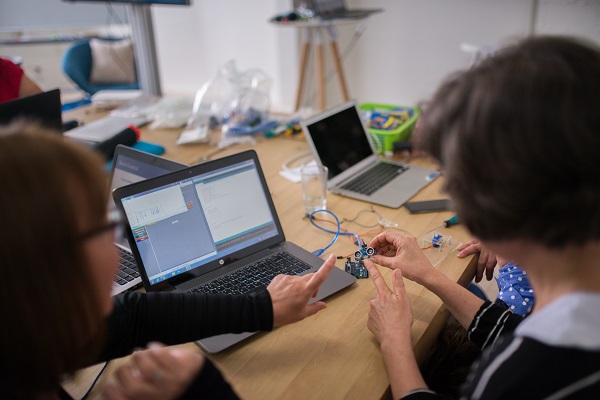
<h2 style="text-align: justify;">When we think about the purpose of education and the relevance of what we are teaching, what are our answers?</h2>
<p style="text-align: justify;">Why do teachers need to upskill, reinvigorate their teaching and ignite new passions towards their teaching practice?</p>
<p style="text-align: justify;">The traditional learning style in the classroom will become less and less relevant to the lives of our students, and to the needs they have going forward into an uncertain future. Today the most up to date information, access to knowledge, research and innovation can be found online, by anyone, all of the time. We need to embrace this change in the way we access information and knowledge. We need to use new and emerging technologies to empower our students, our learning and ourselves.</p>
<p style="text-align: justify;">Understanding how to use digital technologies in the classroom in a relevant and integrated approach is essential if we are to equip the young people of New Zealand with the skills they need to live, work and thrive in the world. It is critical that teachers and students alike can navigate and learn in a digital landscape and be a part of the technological world. With the aid of current and emerging digital technologies we have the power to transform our teaching and learning. To stay abreast of the changes in education and the world we need to commit to new ways of learning, new practices and new pedagogies.</p>
<p style="text-align: justify;">Pressures on principals and school leaders to raise achievement, and the focus on priority learners, has often meant blanket approach to the professional learning and development for educators, and delivered curriculum-based to all teachers in the school or department.</p>
<figure id="attachment_6957" aria-describedby="caption-attachment-6957" style="width: 600px" class="wp-caption aligncenter"><img class="wp-image-6957 size-full" src="https://www.schoolnews.co.nz/wp-content/uploads/2017/08/SN38-TEACHERS-DESK-Professional-Development-3.jpg" alt="" width="600" height="400" /><figcaption id="caption-attachment-6957" class="wp-caption-text">Teachers need to upskill continuously &#8211; image credit: The Mind Lab by Unitec</figcaption></figure>
<p style="text-align: justify;">With the Government’s recent announcement to make the curriculum more digitally oriented, schools and teachers now have more <a class="wpil_keyword_link" href="https://www.schoolnews.co.nz/2015/10/developing-opportunities-at-school-with-a-view/" title="opportunities" data-wpil-keyword-link="linked" target="_blank">opportunities</a> to choose what they want to learn about and how they would like to upskill.</p>
<p style="text-align: justify;">Education minister Nikki Kaye has stressed the importance of upskilling our teachers, and the need to provide them with the necessary knowledge and capability to teach the new digital technologies curriculum content. In fact, $24 million of the newly announced $40 million package to enhance digital fluency is being put towards teacher professional learning and development, and the new system is focused on delivering the right support at the right time to the schools, kura and Communities of Learning | Kāhui Ako that need it most.</p>
<p style="text-align: justify;">Teachers need to take this opportunity to empower themselves and their students and lead change in their schools by embracing new ideas and tools, and using digital technologies in collaborative ways to enhance their practice and the experience of the students.</p>
<p style="text-align: justify;">In the world outside our schools, change is all around us. More and more people are relying on digital technologies to streamline, improve, and modify their everyday lives, yet schools are often still teaching the same content in the same way it was taught ten, 30 or even 50 years ago.</p>
<p style="text-align: justify;">How do we make positive long-term changes to our practice? One such way is to learn amongst peers over a period of time. This way, you can try things out with your fellow teachers, reflect on what you have done, discuss it and critique it. We know that professionals need to be on a constant learning curve, responding and growing to the needs of their learners, day by day.</p>
<p style="text-align: justify;">Professional learning works best when it’s collaborative, authentic and ongoing, supporting all learners and the development of our profession.</p>
<p style="text-align: justify;">This is already happening in pockets of New Zealand. At The Mind Lab by Unitec, teachers from different schools, year levels and subjects (sometimes even competing schools) come together to learn alongside each other on a postgraduate course. In hands-on, collaborative sessions, teachers learn how to challenge their thinking and their pedagogy &#8211; to lead from the classroom, trial new ideas, pedagogies, digital technologies and ways of teaching. This way teachers are committing time to see what works and what doesn&#8217;t, reflecting and discussing with other teachers about their own ongoing learning. This isn’t about the curriculum, it’s about rethinking the way we teach, and how we use digital technologies in the classroom to enhance the learning.</p>
<p style="text-align: justify;">Our understanding of knowledge has changed. Anyone can access knowledge using digital devices, what is important is what we do with that knowledge. Our curriculum, our students and our teachers need to keep up with the fast-changing world. To participate successfully and use the knowledge that’s at our fingertips teachers need to embrace the changes we face and challenge themselves to be learners too, and students and teachers alike, need to not only be confident users of technology but creators, innovators and inventors.</p>

EXCLUSIVE: Teachers used to be paid two to three times more than minimum wage workers,…
After an “overwhelming” vote to reject the latest Government offer, secondary school teachers will begin…
Second-language learning should be compulsory, says a new report from a forum bringing together academics,…
A new entitlement aimed to improve access to learning support coordinators for schools with students…
Educators have raised questions about the Ministry of Education’s new secondary school subjects, set to…
Professional learning and development (PLD) for teachers needs to be higher impact for teachers and…
This website uses cookies.